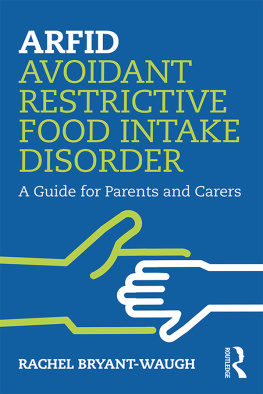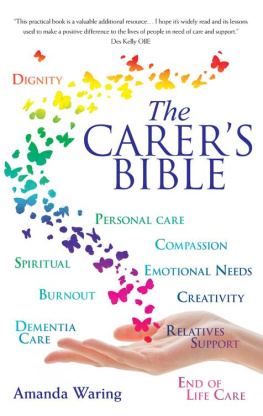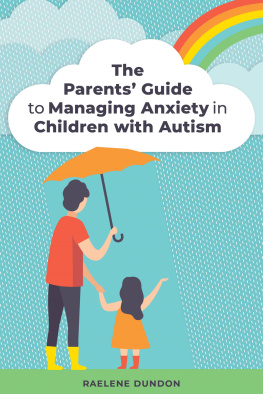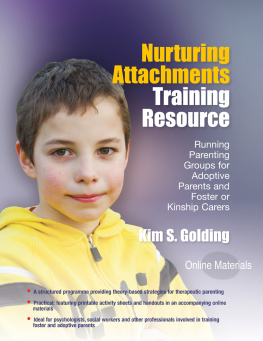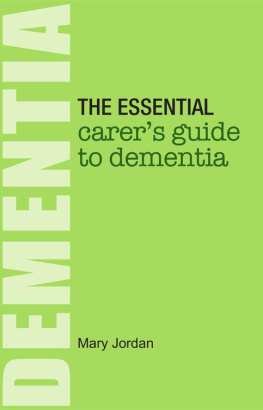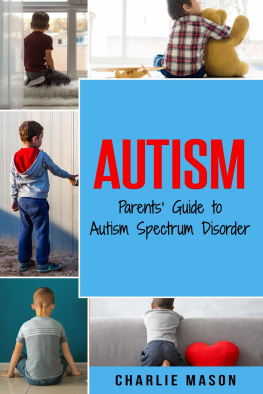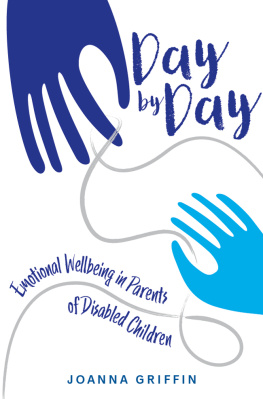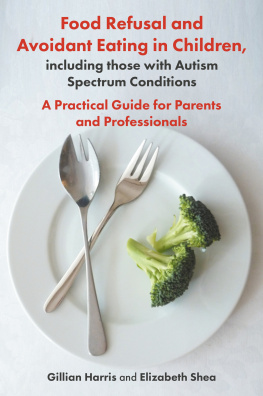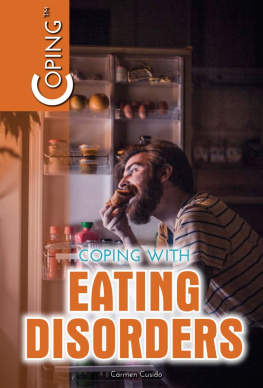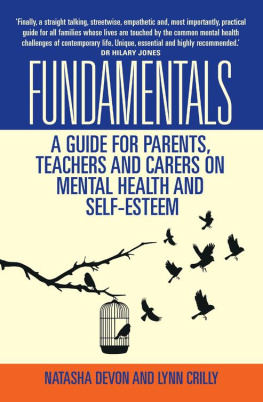ARFID Avoidant Restrictive Food Intake Disorder: A Guide for Parents and Carers is an outstanding resource designed to help parents/carers understand the complexities of a diagnosis of ARFID, its consequences and treatment. This accessible guide combines clinical cases and up-to-date research. Bryant-Waughs depth of experience working with children and families with ARFID brilliantly captures how to make sense of the everyday challenges that a diagnosis of ARFID brings to children and their families. This go-to resource fills a much needed gap in providing parents/carers with strategies in supporting their child with ARFID.
Debra K. Katzman, MD, Professor of Pediatrics, Hospital for Sick Children and University of Toronto
This is a brilliantly written, clear, practical and engaging book by the world-expert in the field. It uniquely combines research and clinical wisdom, illustrated by multiple varied examples, to provide a comprehensive understanding of the problem and how to address it. The 5-step approach is exceptionally valuable with sequential guidance about how to enable positive change. It is essential reading for any parent or practitioner wanting to help children overcome these difficulties and is a fantastic resource that has the potential to transform lives.
Roz Shafran, Professor of Translational Psychology UCL Great Ormond Street Institute of Child Health
This is a long overdue guide for parents. Dr Bryant-Waugh has been a leading clinical and research expert in feeding difficulties for many years, and it is pleasing to see this wealth of experience and advice into one volume. I have no doubt it will be extremely helpful for families and children with ARFID. The suggested approaches are positive, non-blaming and focused on hope, for this is key as many children will manage and improve, but a whole family and inspiration of confidence are needed. This book provides both.
Dr Lee Hudson, Consultant Paediatrician Great Ormond Street Hospital
ARFID Avoidant Restrictive Food Intake Disorder
ARFID Avoidant Restrictive Food Intake Disorder: A Guide for Parents and Carers is an accessible summary of a relatively recent diagnostic term. People with ARFID may show little interest in eating, eat only a very limited range of foods or may be terrified something might happen to them if they eat, such as choking or being sick. Because it has been poorly recognised and poorly understood it can be difficult to access appropriate help and difficult to know how best to manage at home.
This book covers common questions encountered by parents or carers whose child has been given a diagnosis of ARFID or who have concerns about their child. Written in simple, accessible language and illustrated with examples throughout, this book answers common questions using the most up-to-date clinical knowledge and research.
Primarily written for parents and carers of young people, ARFID Avoidant Restrictive Food Intake Disorder includes a wealth of practical tips and suggested strategies to equip parents and carers with the means to take positive steps towards dealing with the problems ARFID presents. It will also be relevant for family members, partners or carers of older individuals, as well as professionals seeking a useful text, which captures the full range of ARFID presentations and sets out positive management advice.
Rachel Bryant-Waugh is a Consultant Clinical Psychologist with over 30 years of experience, specialising in the study and treatment of feeding and eating disorders in children and young people. She is an internationally renowned expert with a high level of clinical and research activity in this field.
First published 2020
by Routledge
2 Park Square, Milton Park, Abingdon, Oxon OX14 4RN
and by Routledge
52 Vanderbilt Avenue, New York, NY 10017
Routledge is an imprint of the Taylor & Francis Group, an informa business
2020 Rachel Bryant-Waugh
The right of Rachel Bryant-Waugh to be identified as author of this work has been asserted by her in accordance with sections 77 and 78 of the Copyright, Designs and Patents Act 1988.
All rights reserved. No part of this book may be reprinted or reproduced or utilised in any form or by any electronic, mechanical, or other means, now known or hereafter invented, including photocopying and recording, or in any information storage or retrieval system, without permission in writing from the publishers.
Trademark notice: Product or corporate names may be trademarks or registered trademarks, and are used only for identification and explanation without intent to infringe.
British Library Cataloguing-in-Publication Data
A catalogue record for this book is available from the British Library
Library of Congress Cataloging-in-Publication Data
A catalog record has been requested for this book
ISBN: 978-0-367-08608-4 (hbk)
ISBN: 978-0-367-08610-7 (pbk)
ISBN: 978-0-429-02335-4 (ebk)
For Alexander, Will, Annelies and Joe, who have always helped me to keep things in perspective when it comes to parenting, childrens eating, and family mealtimes.
Figures
Tables
With heartfelt thanks to all the families I have had the privilege to work with over the years and from whom I have learned so much. My foremost aim has long been to ensure that your stories and experiences are captured through research and writing, and used to continually shape my own clinical practice for the benefit of other families in similar situations. For all the times I have not got things right, or have misunderstood, I apologise.
Many thanks to my trusty critical friends for help with reading the manuscript through and making suggestions for clarifications and changes to make the text more readable and easier to follow.
Above all else, this book is intended to be useful; to be read, dipped into, returned to, or used to open a conversation, as fits the readers preferences, circumstances or requirements. It aims to provide an update on the current state of knowledge about ARFID in clear language, free of jargon and bias. It covers questions frequently asked by parents or carers whose child has been given a diagnosis of ARFID as well as by those who have concerns that their child may be showing signs of this disorder. In order to illustrate situations in a meaningful way, examples of the wide range of different types of difficulty encountered by those affected by avoidant and restrictive eating behaviours are woven through the text.
Throughout the book, the personal and possessive pronouns they, them, their are used in relation to child, rather than he/she, him/her, his/hers, to include all children whatever their sex or gender. The term child is used here to refer to infants, children, and young people up to the age of 18 years. When your child is referred to, this could therefore include teenage offspring. The intention is to be as inclusive as possible; after all ARFID occurs across this age range and into adulthood. The term parents is sometimes used alone and sometimes in conjunction with carers. When used alone it usually refers to anyone in a primary parenting role, whether they are a biological parent, or other primary care-giver. Finally, the words we and our are predominantly used to refer to people in general, rather than to clinicians, scientists, or any other single group. The author is a mental health practitioner and academic, but also a parent, daughter, partner, and friend. A distinction between us (clinicians, scientists) and you/them (parents/carers) seems artificial and unnecessary. It also goes against the collaborative style of working, recommended in this book, which is based on sharing knowledge and integrating perspectives.

